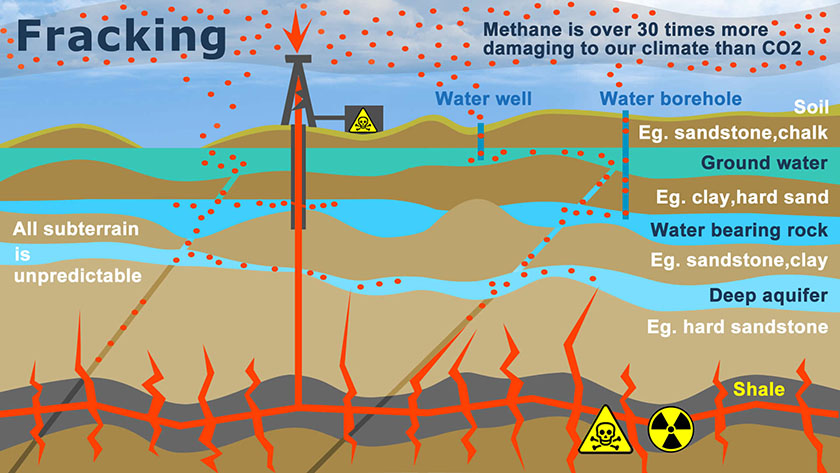
| |
Hi :) My name is Elizabeth Thomsen and I am part of Labour in Bournemouth and I have campaigned in Lancashire, in Purbeck, Bournemouth and on the Isle of Wight against Fracking, also organised legal action that stopped a fracking project in Denmark. Here's my film (https://youtu.be/58q_-NYZh80) and website: http://environmentalactionhub.com Labour candidate in 2017, Jed Sullivan, who lives near Preston New Road Fracking Site in Lancashire appears in my film, as well as many other local campaigners against fracking. I am going to campaign in Preston this Wednesday and I was hoping you could spread the news and encourage people to join me as I am campaigning with costume, guitar and leaflets in the square outside Harris Museum and Art Gallery from noon to 3 pm. (See my outfit in the photo.) I also enclose the list of chemicals that are likely to be dispersed in the subterrain = drinking water, if they get permission to frack one of these days. The 10 Scariest Chemicals Used In Hydraulic Fracking The 14 leading hydraulic fracturing companies in the U.S. injected 10.2 million gallons of more than 650 products that contained chemicals that are known or possible human carcinogens, regulated under the Safe Drinking Water Act, or listed as hazardous air pollutants. Methanol "Many of the hydraulic fracturing fluids contain chemical components that are listed as 'proprietary' or 'trade secret.' I also attach photos from the fracking site at Preston New Road, as well as one from Yorkshire, so you can see it's unfortunately still going ahead. I would advice that you write to Rt Hon Greg Clark, Secretary of State for Business, Energy and Industrial Strategy to convince him to not allow fracking: greg.clark.mp@parliament.uk. Here are some reasons and do study my website for more information and inspiration. Water resources Fracking must be banned everywhere because it: - pollutes the aquifers irreversibly with biocides and toxic and radioactive substances - creates earthquakes and destabilises the subterrain - worsens climate change - produces vast amounts of toxic waste including volatile organics and other carcinogens - produces or releases radioactive deposits - releases the neurotoxin, silica. - accelerates species extinction - contributes to forest fragmentation - creates conduits for invasive species - industrializes the landscape - exposes workers to hazardous working conditions, carcinogens, and labor abuses - exposes communities to high public health risks We cannot even allow exploratory drilling as the toxic and radioactive substances, which would be partly pumped down under very very high pressure and partly released from the existing subterrrain, will migrate, upwards, and the way it's dispersed in the subterrain is unpredictable. Our 'bedrock' is not an impermeable rock. It's more like a water filled sponge, and keep in this context that very very high pressure is applied to the toxic and radioactive substances in the process. We, as a democratic society, have not consciously made the consequential very serious (wrong) decision to undermine our own existence by fracking and sacrificing our fresh water. If such a plan was documented and communicated to the public, it would surely not pass. We, as a society, could not have a prosperous healthy agriculture (Californian produce grown with frack-water are toxic and there has been pushed for labeling of them), we could not brew beer (German breweries stopped fracking there), produce whiskey (Scotland wants fracking banned) or take a bath - and all the toxic and radioactive fracked water cannot be processed to become safe again, and would be (should be) removed from the eco-system. A very unsustainable strategy, and bottled water transported to the consumers?!! How would that be green? Or healthy? Or practically possible to run a farm or a business? There has been no calculation of the cost of sacrificing aquifers (that are interconnected, so endless damage). Quotes from Anthony R Ingraffea and Mike Wills: “Frack fluid migrate up, among other things through faults and old wells. By drilling, casing, cementing, you pollute groundwater with frack fluid and methane emissions. To casket (case?) a hole is the problem. There is large pressure and 10.000 holes (?) and the gas escapes. Hardened cement paste is used, it's not a good material, not flexible, not impermeable, it ages badly, and certainty a significant percentage of all gas wells are leaking and will leak. This will never be solved. Since 2010 5-10% of gas wells are leaking in Pennsylvania, there are 1,000 wells leaking into drinking water in Pennsylvania, 100 families have lost access to water.” (Anthony R Ingraffea) I've worked on more well sites and drilling sites than I care to mention. It's a very inexact science. There is no 100% sure way to protect a water table sitting above a well. Once the casing is in it’s in. It’s not like you can remove it and change it every 10 years! Forget visual impacts on the environment - as unpleasant as that is - it’s water table contamination that is the major issue and there is no 100% safe protection method. (Mark Wills) 













LIKE our Facebook PAGE and get news from us.
|

